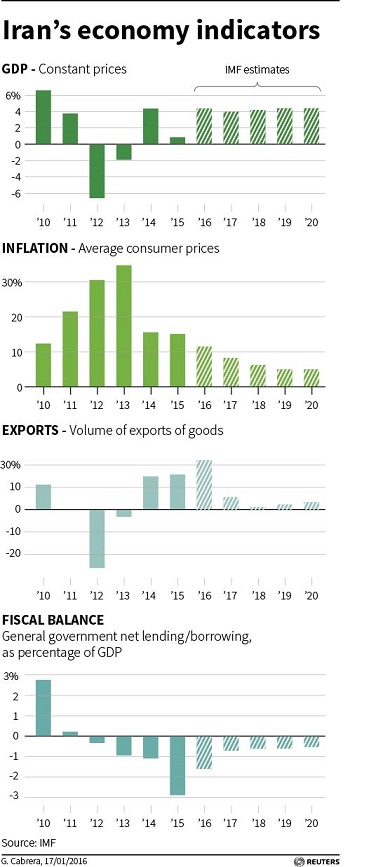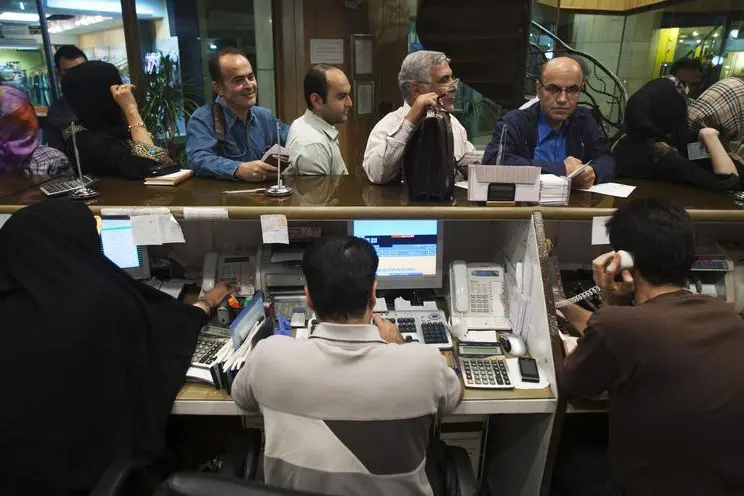PHOTO
* Iranian banks have non-performing loans, low capital
* Need to catch up with global regulation
* Banks think Iran may introduce Basel III
* Foreign banks unlikely to make direct investments
By Jonathan Saul and Tom Arnold
LONDON/DUBAI, Jan 28 (Reuters) - Iranian banks will have to adjust to tougher international regulations and may need to offload non-performing loans into a "bad bank" to pick up where they left off when sanctions were imposed almost four years ago.
The banks will be crucial to deal-making and cash flow as Iran seeks to win business from foreign firms and attract investment to upgrade its infrastructure now that curbs have been lifted on its banking, insurance, shipping and oil sectors.
They are expected to be able to link up with international lenders to process transactions within a matter of weeks following a deal with world powers earlier this month curbing Iran's nuclear programme.
But restrictions preventing U.S. banks dealing with the country will remain in place and Iran's banks will have to contend with a financial world very different from when they were cut off in 2012.
"Isolation of Iran's money market from international markets resulted in the inability of the Iranian banks to coordinate with international developments," said Ali Sanginian, chief executive of privately owned Amin Investment Bank.
"This has led to these banks severely lacking in the areas of investment quality, capital adequacy, internal control and other safeguarding regulations in comparison to international standards," said Sanginian, whose institution is Iran's biggest investment bank with more than $1 billion of assets under management.
Many of Iran's banks struggled with bad debt during the sanctions era. The situation was compounded by several banks having exposure to the country's property market, which turned sour in 2012 leaving problem loans in the system.
Official data showed the ratio of non-performing loans to total loans was 13.4 percent in the Iranian month ending June 21, 2015. Market estimates point to nearly double that figure with the equivalent of $40 billion at the top end of estimates for non-performing loans.
"The biggest issues Iranian banks face is the high level of non-performing loans and the low capital buffers," said Constantinos Kypreos, senior analyst at ratings agency Moody's Financial Institutions Group.
Kypreos said the Iranian banking sector remains undercapitalised with a reported 2014 capital adequacy ratio of 6.8 percent versus a regional average capital adequacy ratio of over 13 to 14 percent.
"(With) concerns about the under-reporting of problematic loans, the sector is in need of substantial new capital," he added.
Since the 2008 financial crisis, most banks must adhere to international capital standards, known as Basel III, which require them to bolster their balance sheets.
Some Iranian bankers expect the country's central bank to impose those standards on them at some stage. When asked last week, a senior central bank official declined to comment.
Banks are also expected to take painful write-downs on many of the direct equity investments (DEIs) on their balance sheets.
"Today's market value of these investments is much lower than what is shown on the books of respective banks," said Parviz Aghili, chief executive of privately owned Tehran-based Middle East Bank.
"If we were to set off 'doubtful loans' and 'DEIs' of a bank against its capital (mandatory under Basel-III), then many Iranian banks will end up with a negative capital."
Ali Amiri of ACL, an investment management firm focused on Iran with operations in Tehran, adds though that regulators may be able to help banks on that front.
"Introducing a bad bank where all these loans are cleaned out and put into that bank ... is something that is being studied and looked at by the regulators inside Iran and seems to be an option," he said.
"The situation is not dire."
BAD DEBT LEGACY
The Iranian banking sector consists of eight state-owned and 19 privately owned banks which held a combined $582 billion in assets at the end of 2014, according to central bank data. By comparison, South Africa's banking sector has over $400 billion in assets, while Turkey's has about $800 billion.
State-owned Post Bank of Iran, Bank Sepah, Export Development Bank of Iran, Bank of Industry and Mine, and Bank Melli Iran did not respond to requests for comments for this article.
Middle East Bank's Aghili said Iran's banking sector would have to seek capital injections wherever it could for now, though winning investments from foreign banks will be tough given that global rules now make it more expensive for them to take minority stakes in other lenders.
"Banks - whether it is Chinese or Western - cannot really afford to make acquisitions around the world because the cost of managing and running these banks has become so expensive," Aghili said.
Many international sanctions relating to Iran's nuclear programme were lifted but most involving U.S. measures remain in place. Non-U.S. banks may trade with Iran without fear of punishment in the United States but U.S. banks may not do so, directly or indirectly.
European banks are still cautious though.
A senior manager at a large financial institution in Germany said: "We don't want to be the pioneer. It would still be very complicated for us to do business with Iran because many U.S. sanctions are still in place."
Amin Investment Bank's Sanginian said there was still "some mistrust" between banks due to in part previous fines imposed by U.S. regulators.
"We even predict that some giant international banks ... will refuse to cooperate with Iranian financial institutions," he said.
"In order to mitigate these problems, some preliminary steps such as the establishment of regulatory rules based on international norms and conditions must be taken and, in short, we must move towards the international regulatory framework of Basel III."

(Additional reporting by Andreas Kroener in Frankfurt; Editing by Rachel Armstrong and Philippa Fletcher) ((jonathan.saul@thomsonreuters.com; + 44 207 542 4357 ; Reuters Messaging: jonathan.saul.thomsonreuters.com@reuters.net))
* Need to catch up with global regulation
* Banks think Iran may introduce Basel III
* Foreign banks unlikely to make direct investments
By Jonathan Saul and Tom Arnold
LONDON/DUBAI, Jan 28 (Reuters) - Iranian banks will have to adjust to tougher international regulations and may need to offload non-performing loans into a "bad bank" to pick up where they left off when sanctions were imposed almost four years ago.
The banks will be crucial to deal-making and cash flow as Iran seeks to win business from foreign firms and attract investment to upgrade its infrastructure now that curbs have been lifted on its banking, insurance, shipping and oil sectors.
They are expected to be able to link up with international lenders to process transactions within a matter of weeks following a deal with world powers earlier this month curbing Iran's nuclear programme.
But restrictions preventing U.S. banks dealing with the country will remain in place and Iran's banks will have to contend with a financial world very different from when they were cut off in 2012.
"Isolation of Iran's money market from international markets resulted in the inability of the Iranian banks to coordinate with international developments," said Ali Sanginian, chief executive of privately owned Amin Investment Bank.
"This has led to these banks severely lacking in the areas of investment quality, capital adequacy, internal control and other safeguarding regulations in comparison to international standards," said Sanginian, whose institution is Iran's biggest investment bank with more than $1 billion of assets under management.
Many of Iran's banks struggled with bad debt during the sanctions era. The situation was compounded by several banks having exposure to the country's property market, which turned sour in 2012 leaving problem loans in the system.
Official data showed the ratio of non-performing loans to total loans was 13.4 percent in the Iranian month ending June 21, 2015. Market estimates point to nearly double that figure with the equivalent of $40 billion at the top end of estimates for non-performing loans.
"The biggest issues Iranian banks face is the high level of non-performing loans and the low capital buffers," said Constantinos Kypreos, senior analyst at ratings agency Moody's Financial Institutions Group.
Kypreos said the Iranian banking sector remains undercapitalised with a reported 2014 capital adequacy ratio of 6.8 percent versus a regional average capital adequacy ratio of over 13 to 14 percent.
"(With) concerns about the under-reporting of problematic loans, the sector is in need of substantial new capital," he added.
Since the 2008 financial crisis, most banks must adhere to international capital standards, known as Basel III, which require them to bolster their balance sheets.
Some Iranian bankers expect the country's central bank to impose those standards on them at some stage. When asked last week, a senior central bank official declined to comment.
Banks are also expected to take painful write-downs on many of the direct equity investments (DEIs) on their balance sheets.
"Today's market value of these investments is much lower than what is shown on the books of respective banks," said Parviz Aghili, chief executive of privately owned Tehran-based Middle East Bank.
"If we were to set off 'doubtful loans' and 'DEIs' of a bank against its capital (mandatory under Basel-III), then many Iranian banks will end up with a negative capital."
Ali Amiri of ACL, an investment management firm focused on Iran with operations in Tehran, adds though that regulators may be able to help banks on that front.
"Introducing a bad bank where all these loans are cleaned out and put into that bank ... is something that is being studied and looked at by the regulators inside Iran and seems to be an option," he said.
"The situation is not dire."
BAD DEBT LEGACY
The Iranian banking sector consists of eight state-owned and 19 privately owned banks which held a combined $582 billion in assets at the end of 2014, according to central bank data. By comparison, South Africa's banking sector has over $400 billion in assets, while Turkey's has about $800 billion.
State-owned Post Bank of Iran, Bank Sepah, Export Development Bank of Iran, Bank of Industry and Mine, and Bank Melli Iran did not respond to requests for comments for this article.
Middle East Bank's Aghili said Iran's banking sector would have to seek capital injections wherever it could for now, though winning investments from foreign banks will be tough given that global rules now make it more expensive for them to take minority stakes in other lenders.
"Banks - whether it is Chinese or Western - cannot really afford to make acquisitions around the world because the cost of managing and running these banks has become so expensive," Aghili said.
Many international sanctions relating to Iran's nuclear programme were lifted but most involving U.S. measures remain in place. Non-U.S. banks may trade with Iran without fear of punishment in the United States but U.S. banks may not do so, directly or indirectly.
European banks are still cautious though.
A senior manager at a large financial institution in Germany said: "We don't want to be the pioneer. It would still be very complicated for us to do business with Iran because many U.S. sanctions are still in place."
Amin Investment Bank's Sanginian said there was still "some mistrust" between banks due to in part previous fines imposed by U.S. regulators.
"We even predict that some giant international banks ... will refuse to cooperate with Iranian financial institutions," he said.
"In order to mitigate these problems, some preliminary steps such as the establishment of regulatory rules based on international norms and conditions must be taken and, in short, we must move towards the international regulatory framework of Basel III."

(Additional reporting by Andreas Kroener in Frankfurt; Editing by Rachel Armstrong and Philippa Fletcher) ((jonathan.saul@thomsonreuters.com; + 44 207 542 4357 ; Reuters Messaging: jonathan.saul.thomsonreuters.com@reuters.net))





















